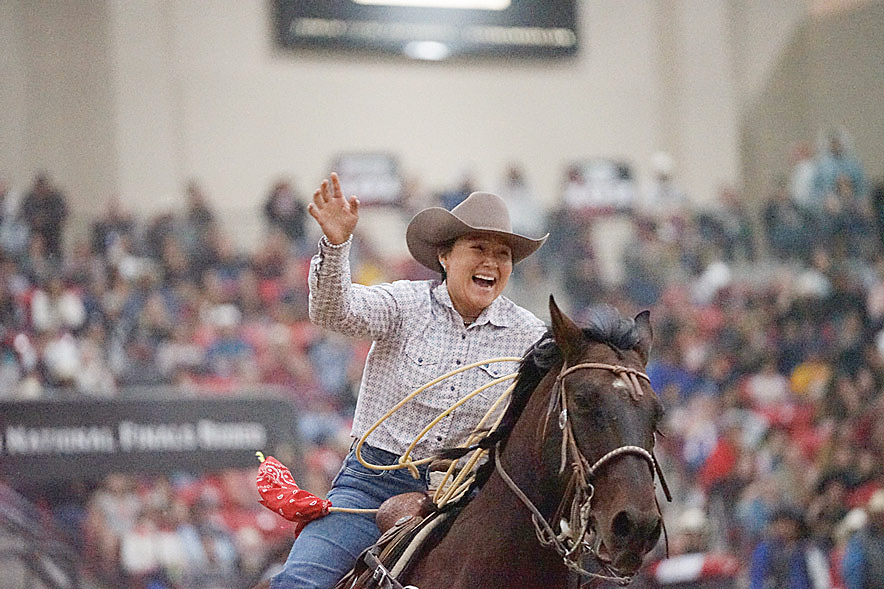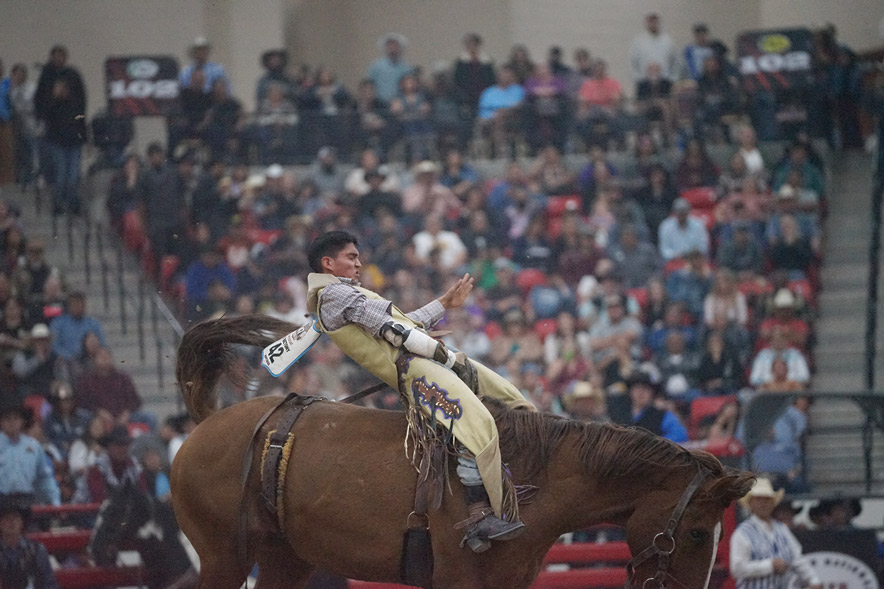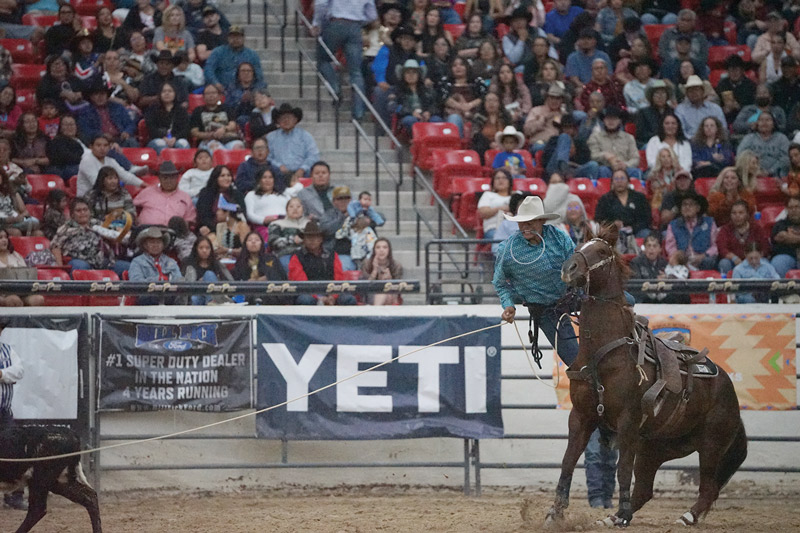
- Details
- By Quinten Jodi | Navajo Times
“We’re here.”
That was the response Evan Betony gave during the championship round of the 47th Annual Indian National Finals Rodeo on Saturday night at the Southpoint Equestrian Center in Las Vegas, Nevada.
Editor's Note: This article was first published by the Navajo Times. Used with permission. All rights reserved,
The Toadlena, Ariz., cowboy was asked about the Navajo Nation’s dominance at this year’s finals as the Diné contingent claimed nine world titles before a nearly sold-out crowd.
Betony won the bareback event by covering four draws with 320 points, which included a first-place finish of 85 points on Saturday night.

Toadlena, Ariz., cowboy Evan Betony stays aboard his horse during Saturday night’s championship round at the 2023 INFR. Betony won the world title with a 320-point aggregate. (Photo/Navajo Times - Quentin Jodie)
Betony waited nearly an hour to be crowned world champion after he completed his ride as South Dakota cowboy Kashton Ford took a re-ride after posting a 54-point ride after his first horse failed to perform at an optimal level.
In his redraw, Ford scored 73 points and took third overall with a 304-point aggregate. Ford finished behind Betony and South Dakota cowboy Steven Dewolfe (308).
While Betony waited, two first-time qualifiers won their respective titles. Crownpoint, N.M., cowboy Tydon Tsosie captured the steer wrestling event, followed by Janae Todacheenie of Indian Wells, Ariz. taking the breakaway event.
“I expected to be up there, but I didn’t expect to win it,” said Tsosie, who dropped four steers in 16.11 seconds.
“I just drew a lot of good steers, and my brother hazed them all good,” he said of his older sibling, Tylon Tsosie. “I just thank him for it and he’s a real good hazer. He’s been there since Day 1 and I can’t thank him enough.”
Tsosie narrowly edged South Dakota bull dogger Joe Wilson, who finished with a 16.84 aggregate.
Todacheenie beat out former INFR world champs Jareth Curley for the title as the two ropers were the only contestants to rope all of their draws.
Todacheenie finished the four-round aggregate in 10.49 seconds while Curley recorded a 13.7 aggregate.

Brimhall, N.M., cowboy Hiyo Yazzie dismounts his horse during the INFR championship round on Saturday night in Las Vegas, Nev. Yazzie won the go-round with a 7.78 run in the tie-down event that helped him secure the men’s all-around title. (Photo/Navajo Times - Quentin Jodie)
“I was trying to rope each calf under three seconds, and I tried to take the best shot every time,” Todacheenie said.
In the team roping, 20 year-old Trey Begay repeated as the world champion in the heading position. He won this year’s crown with a new partner in Dennison Boone, who was a first-time INFR qualifier.
The pair roped four steers in 21.51 seconds with the team of Westley and Hank Benally finishing as the reserve champions for the second year in a row as that latter pair recorded four runs in 24.73 seconds.
“This really means a lot and I couldn’t have done it without Trey,” Boone said. “I just fed off him. As fast as he goes, that is as fast as I go.
“All week he made my job easy,” he added.
The two ropers qualified through the year-end standings, and they were paired up at the INFR this year. And although they don’t rope together often, they hit two rodeos prior to this year’s finals.
“Everything just worked out,” Begay said. “It worked out for a lot of us Navajos, and I’m proud of everybody.”
In the bull riding, JaCauy Hale celebrated his 22nd birthday with an INFR title. The Ganado, Ariz., bull rider covered 3-of-4 bulls for 216 points. Hale had to wait for the outcome of Montana cowboy Bo Tyler Vocu, who needed a 58-point ride to win the world.
Vocu, who received a re-ride, was unable to cover his final draw as that gave Hale the win.
“I didn’t expect this at all,” Hale said. “I just tried not to think about it. I just wanted to do my job.”
In the all-around race, Brimhall, N.M., cowboy Hiyo Yazzie and Winslow cowgirl Tara Seaton emerged as champions. For their victories, they were each awarded horse trailers.
Seaton qualified in the barrel racing and breakaway, earning checks in both events.
Yazzie, meanwhile, placed in three events, which included a seventh-place finish in the aggregate race in the tie-down event.
“Oh man, this is the first of many,” Yazzie said. “It feels pretty good.”
On Saturday night’s championship round, the multi-talented cowboy won the tie-down event with a 7.78 run and in the steer wrestling he posted a second-place run of 3.67 seconds to secure his all-around title.
“I just tried to have a lot of fun and do the best job that I could,” Yazzie said.
Earlier Saturday, junior bull rider Royd Billie got it started with a first-place win in the average race. The Winslow cowboy rode 2-of-3 draws for 155 points.
Help us tell the stories that could save Native languages and food traditions
At a critical moment for Indian Country, Native News Online is embarking on our most ambitious reporting project yet: "Cultivating Culture," a three-year investigation into two forces shaping Native community survival—food sovereignty and language revitalization.
The devastating impact of COVID-19 accelerated the loss of Native elders and with them, irreplaceable cultural knowledge. Yet across tribal communities, innovative leaders are fighting back, reclaiming traditional food systems and breathing new life into Native languages. These aren't just cultural preservation efforts—they're powerful pathways to community health, healing, and resilience.
Our dedicated reporting team will spend three years documenting these stories through on-the-ground reporting in 18 tribal communities, producing over 200 in-depth stories, 18 podcast episodes, and multimedia content that amplifies Indigenous voices. We'll show policymakers, funders, and allies how cultural restoration directly impacts physical and mental wellness while celebrating successful models of sovereignty and self-determination.
This isn't corporate media parachuting into Indian Country for a quick story. This is sustained, relationship-based journalism by Native reporters who understand these communities. It's "Warrior Journalism"—fearless reporting that serves the 5.5 million readers who depend on us for news that mainstream media often ignores.
We need your help right now. While we've secured partial funding, we're still $450,000 short of our three-year budget. Our immediate goal is $25,000 this month to keep this critical work moving forward—funding reporter salaries, travel to remote communities, photography, and the deep reporting these stories deserve.
Every dollar directly supports Indigenous journalists telling Indigenous stories. Whether it's $5 or $50, your contribution ensures these vital narratives of resilience, innovation, and hope don't disappear into silence.
 The stakes couldn't be higher. Native languages are being lost at an alarming rate. Food insecurity plagues many tribal communities. But solutions are emerging, and these stories need to be told.
The stakes couldn't be higher. Native languages are being lost at an alarming rate. Food insecurity plagues many tribal communities. But solutions are emerging, and these stories need to be told.
Support independent Native journalism. Fund the stories that matter.
Levi Rickert (Potawatomi), Editor & Publisher
